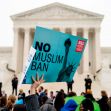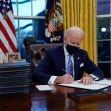President Biden issued the “Modernizing Regulatory Review” Executive Order with the intent to update the review process by obtaining feedback from OMB and other agencies. This feedback will address “how the regulatory review process can promote public health and safety, economic growth, social welfare, racial justice, environmental stewardship, human dignity, equity, and the interests of future generations.” The transition team noted that Biden issued a presidential memorandum withdrawing Trump’s regulatory process executive orders “to remove those needless obstacles to regulating in the public’s interest.”
The new OMB director is Neera Tanden, president of the Center for American Progress. Rob Fairweather, a deputy associate director at OMB under Trump, will be “acting” OMB director until Tanden is confirmed.
Biden also issued an “Executive Order on Revocation of Certain Executive Orders Concerning Federal Regulations.” This order revokes some regulatory reform memoranda from the Trump administration. Included in that revocation are two memos that discourage policymakers from making policy by issuing guidance documents, answers to FAQs, and other “sub-regulatory” means, rather than working through the Administrative Procedure Act process.
This practice, sometimes called “policymaking via memo,” is often criticized because it fails to give notice of changes or allow the regulated community to provide input into the new policies. Examples of this:
1) in labor and employment policy, WHD’s 2015 Administrator’s Interpretations on joint employment and independent contractors, and
2) U.S. Citizenship and Immigration Services documents, like their memo regarding “third-party placement of H-1B holders.”
Trump’s two executive orders, issued on October 9, 2019, state 1) that these “guidance documents” can’t form the basis of enforcement actions on their own, and 2) that agencies must make guidance documents easy to find on their websites and required that issuing agencies take public comments before issuing the final guidance documents. Biden’s executive order revokes both of these.
Biden’s executive order also revoked Trump’s notorious “two out, one in” order. This order required government agencies to repeal two regulations for each new regulation they added.
As is standard procedure for new administrations, Ronald A. Klain, Biden’s chief of staff, issued a “regulatory freeze” memorandum. This memo stops agencies from issuing new or proposed rules, requires them to withdraw rules that have been sent to the Federal Register but have not yet been published, and to postpone effective dates of rules finalized and published in the Federal Register for 60 days.
This freeze memo and the Congressional Review Act can be used to undo any “midnight regulations” issued during the period between August 21, 2020, and the inauguration. The Transportation Department, Commerce Department, and the Environmental Protection Agency have the most eligible rules in the window. The transition team has said that the memo “will pause any new regulations from moving forward and give the incoming administration an opportunity to review any regulations that the Trump administration tried to finalize in its last days… before renewing any regulatory activity.”
It further reads, “Should actions be identified that were undertaken before noon on January 20, 2021 to frustrate the purpose underlying this memorandum, I may modify or extend this memorandum, pursuant to the direction of the president, to request that agency heads consider taking steps to address those actions.”
Guidance documents can be withdrawn immediately, but regulations will have to be undone through the process of new notice and comment periods. Biden will have to resolve any litigation regarding the rules.
The freeze memo does not apply to rules subject to statutory or judicial deadlines, nor to rules that “affect critical health, safety, environmental, financial, or national security matters.”
Amit Narang, regulatory policy advocate for the non-profit Public Citizen, said “Biden is signaling a bold and aggressive regulatory agenda to combat the multiple crises facing our country and undo the enormous deregulatory damage caused by Trump. We look forward to a Biden administration that restores integrity to our regulatory process and ensures that agencies are working for the public interest, and not for the corporations they are supposed to regulate.”






